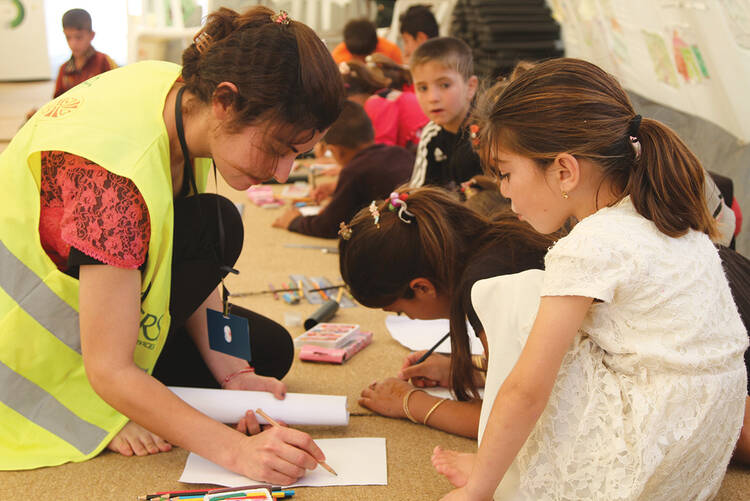In the early days of August 2014, as the summer heat scorched the plains of Nineveh, Islamic State militants began ethnic cleansing around the city of Sinjar, driving thousands among the province’s Yazidi, Christian and other religious and ethnic minority communities from their homes in just a handful of days. A year later survivors remain in northern Iraq, protected by Kurdish peshmerga forces, subsisting in often haphazard shelters around the cities of Erbil, Dohuk and Kirkuk and wondering when—wondering if—they will ever be able to return home.
Hani El-Mahdi is the country representative for Catholic Relief Services in Dohuk. “These are people who escaped from genocide,” he notes matter-of-factly. “The Christian population has been completely uprooted from Mosul, and they’ve ended up here in Kurdistan.” The Christians, El-Mahdi says, are the second largest group of displaced people after the Yazidis. Many families have left loved ones behind whose fate remains uncertain; many have had children, especially young girls, taken from them by ISIS. Some are being held for ransom; many are experiencing a far worse fate, being sold into sexual slavery.
The Chaldean Catholic archbishop of Erbil, Iraq, Bashar Matti Warda, C.Ss.R., notes the persisting failure of the Iraqi government to assist these dislocated communities. He says he is deeply grateful for the support the local church has received from C.R.S., Caritas Internationalis, the Catholic Near East Welfare Association and other agencies. The Knights of Columbus has delivered $3 million in aid. “With this help we’ve been able to at least meet some of the needs,” he says, “but this is a huge task, and the church has not been trained for such a huge task.”
Archbishop Warda was in Philadelphia in mid-August to help launch a public awareness and fundraising campaign by the Knights of Columbus on behalf of Middle Eastern Christians. The archbishop is eager to tap into whatever political pressure the U.S. Catholic community can help bring to bear toward ending the crisis in the Middle East altogether. “You stand up for persecuted people all over the world,” he says. “Clearly [the Christians of Iraq] are a people being persecuted because of their faith.”
The conflict in Syria, he says, is destabilizing the region and drawing in scores of militants who are filling ISIS ranks. Those fighters come from all over the world, including the United States and Europe. “So ISIS is an international problem and it is an international responsibility to respond.”
That effort must not only terminate the threat from ISIS, but find a way to bring peace to the entire region, according to Archbishop Warda, or else Christians cannot have true security and return to their homes with any confidence about their long-term safety.
“Right now we are in a safe area,” the archbishop says. “The spirit of the peshmerga is high, and we depend upon them.” But Erbil’s Christians “are watching what is happening to the [displaced] Christians,” he says. He knows many are wondering if the same fate could befall them one day.
“I am afraid that they will leave the country seeking refuge elsewhere,” Archbishop Warda says. Losing its Christians “would be a big loss for the Middle East and Iraq. For many centuries Christians have been active and present for the Iraqi people.”
It is clear to both El-Mahdi and Archbishop Warda that what began as a provincial emergency has transitioned into a long-term humanitarian and political crisis in northern Iraq. C.R.S. staff are increasingly thinking about how to normalize the living conditions for this displaced population, working to regularize systems for water delivery and sanitation, jury-rigging education programs for the children, many of whom have not been in a classroom since they fled their villages—long-term campaigns perhaps many hoped would not be necessary.
People here, according to El-Mahdi, a year into their expulsion from Nineveh, are beginning to worry that the international community has forgotten them. “There must be an endpoint,” El-Mahdi says. “The whole international community has to step up to find a long term resolution for this situation” and to “make sure it never happens again.”








